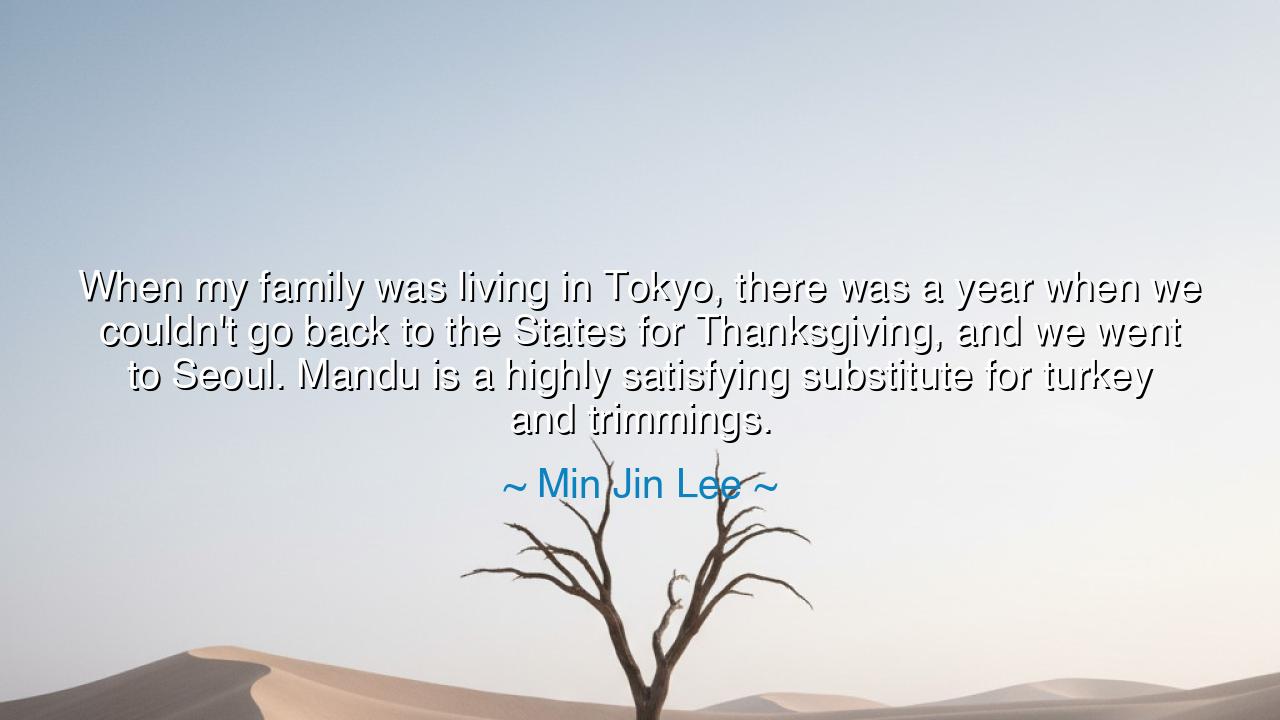
When my family was living in Tokyo, there was a year when we
When my family was living in Tokyo, there was a year when we couldn't go back to the States for Thanksgiving, and we went to Seoul. Mandu is a highly satisfying substitute for turkey and trimmings.






In the words of Min Jin Lee, “When my family was living in Tokyo, there was a year when we couldn't go back to the States for Thanksgiving, and we went to Seoul. Mandu is a highly satisfying substitute for turkey and trimmings.” This utterance, simple in its telling, carries the weight of ancestral wisdom. It speaks not merely of food, but of the soul’s ability to adapt, of the heart’s power to discover belonging wherever it is planted. For though the traditions of a homeland may be far, the spirit of gratitude can flourish in any soil.
The quote arises from the experience of an immigrant writer, whose life and art are shaped by the constant crossing of borders. Thanksgiving, with its roast turkey and overflowing harvest table, is a symbol of American abundance. Yet when distance and circumstance withheld that tradition, the family found sustenance in mandu, the Korean dumpling. In that moment, the sacred feast was reborn, clothed not in its expected form, but in a new garment that was no less holy. The message resounds: the essence of tradition is not the object, but the spirit.
Consider how throughout history, peoples separated from their homelands have carried their celebrations into strange lands, reshaping them with what was at hand. When the Jewish people were driven from Jerusalem, they preserved their faith not in the stones of the Temple, but in the scrolls and songs that could travel in exile. When enslaved Africans in America were denied their rituals, they reshaped fragments of rhythm and song into the mighty river of gospel and blues. These examples remind us that what endures is not the outward form, but the inner flame.
The tale of mandu for turkey is a teaching of flexibility and strength. Where some would despair at the loss of the familiar, others choose to embrace what the present offers, discovering joy anew. It is the hero’s path not to cling stubbornly to the past, but to weave the past into the present with dignity. Thus, mandu, humble though it may seem, becomes heroic. It is not merely food—it is a vessel of memory, resilience, and love.
I recall the story of the Pilgrims themselves, those who celebrated the first Thanksgiving. They had crossed the ocean, leaving behind their villages, their kin, their churches. The feast they made was not adorned with the exact dishes of their English countryside; instead, they ate corn, venison, and fowl shared with the Wampanoag people. The heart of Thanksgiving was born not of replication, but of adaptation, not of sameness, but of shared survival and gratitude. Min Jin Lee’s memory echoes this same truth across centuries.
And so, the lesson for us is clear: do not mistake tradition for rigidity. True tradition is a living river, flowing around stones, reshaping itself, carrying its essence forward. When life denies us the expected, we are invited to create something new that is equally sacred. If the feast cannot be turkey, let it be dumplings. If the table cannot be long, let it be humble. If the people we love cannot be near, let us honor them with remembrance. The true heart of celebration lies not in form, but in presence, gratitude, and love.
To apply this wisdom in life, let each person cultivate a spirit of flexibility. When circumstance strips away the familiar, ask: what essence am I truly seeking? If you cannot celebrate as before, create a new ritual that honors the same spirit. If you cannot gather with many, gather with few, but with sincerity. When you travel, eat the food of that land with reverence, and let it become a feast. In this way, the soul learns to be at home everywhere, and gratitude never fails.
Therefore, hear this teaching, O reader of future days: hold fast to the essence, not the form. For mandu can be as sacred as turkey, a dumpling as noble as a feast, if it is eaten with gratitude and shared in love. Let your life be abundant not in rigid rituals, but in the spirit that can transform all things into blessings. This is the path of wisdom, and the true feast that endures.






AAdministratorAdministrator
Welcome, honored guests. Please leave a comment, we will respond soon